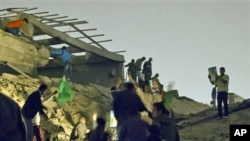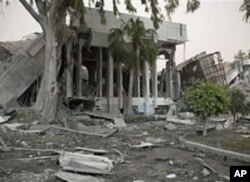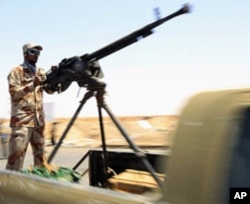Warplanes from the North Atlantic Treaty Organization continue to attack the forces of Libyan leader Moammar Gadhafi. But some analysts say air power alone will not defeat the Libyan leader, and they argue that the Libyan rebels must get better weapons.
For more than a month, NATO fighter jets have been enforcing a United Nations mandated no-fly zone over Libya, preventing Colonel Moammar Gadhafi from using air power against Libyans who have rebelled against him.
NATO warplanes have also attacked the Libyan leader’s military installations, communication sites and command and control centers. Gadhafi’s compound in Tripoli has been hit.
Some military analysts say the international coalition has in essence become the rebels’ air force.
Officially, the NATO action is to protect innocent civilians. But several western leaders, including President Barack Obama, have said Gadhafi must go - prompting experts to say the real objective is regime change, something the U.S. president has denied.
John Bolton, former U.S. ambassador to the United Nations, says Colonel Gadhafi can be defeated by air power alone. "By attacking where we think Gadhafi is. By attacking the top command of his military. By attacking the regime’s military. By attacking government offices and making it clear we are going to shatter that regime and we’re not going to stop until we succeed," he said.
Issues behind air power
But despite NATO's air strikes, the rebel forces have made little progress in their fight against the Libyan leader.
Paul Rogers, Professor of Peace Studies at Bradford University in Britain, says there are two reasons why air power alone will not change the situation.
"One is that the forces loyal to Colonel Gadhafi have proved very versatile," he said. "They’ve adapted very quickly having to operate under aggressive air cover, dispersing their equipment, avoiding the use of large items and the rest."
"The other issue is that in fact the NATO countries that are primarily involved - that is Britain and France, now that the United States has withdrawn most of its strike aircraft - these countries are actually running really quite badly short of precision-guided munitions they are using. So there is actually a shortage at that level, which may in the next week or two limit the degree of air cover that NATO can actually provide," he added.
Italy, which is providing military bases for logistical support, says it will also participate in air strikes in Libya.
But Rogers says the main problem is that the rebel force is disorganized and ill-equipped. "It looks as though quite a number of the military who basically have left the Gadhafi regime have really gone to ground, they’ve not formed part of the rebellion," he said.
"And essentially what you do have is a lot of enthusiastic, very committed and often very courageous people, but with no real military training and very little in the way of modern armaments. There have been many cases where they may have had machine guns or side arms but without the munitions to use them."
'Game-changing weapons'
Given the rebel forces' lack of military equipment, some western politicians and analysts have been advocating arming the Libyan opposition.
One of these advocates is Barak Seener, a Middle East expert with London’s Chatham House (Royal United Services Institute) who says the rebels need what he calls "game-changing weapons."
"Game-changing weapons could be heavy artillery, because until recently, they’ve only been having light weaponry, such as Kalashnikovs, but they’ve not had heavy artillery in the same element as the Gadhafi forces have had," said Seener.
More forceful action needed
Seener also says weapons are not enough. "They need to have Special Forces that are training them on the ground, really reinforcing their command and control that are coordinating their attacks. And they need to have more weapons, they need to have money as well - so they need to be armed properly and to be really invested in by the international community in order to uproot the Gadhafi regime," he said.
Several European countries say they will provide military advisers to the rebels - advisers in a non-combat role.
But some experts say in addition to arming the rebels, much more forceful action is needed to defeat Colonel Gadhafi’s forces, such as providing combat troops alongside the rebel forces.






